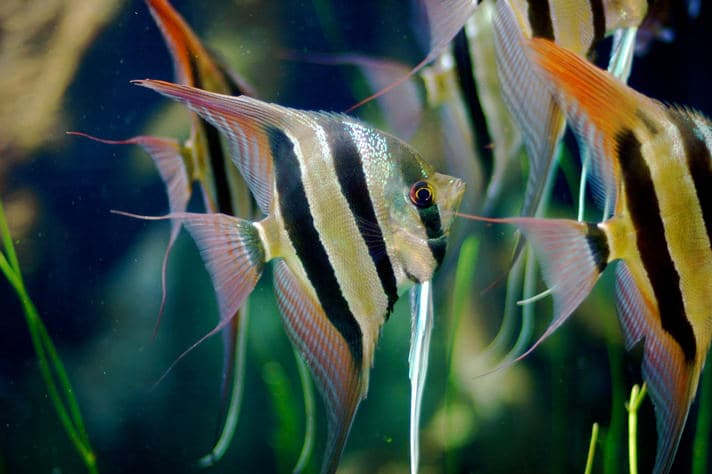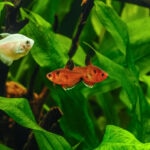The Altum Angelfish

Photo by Chewy
In the world of the tropical fish hobby, it is safe to assume that most aquarists have kept the common angelfish (Pterophyllum scalare) in one form or another. Since the introduction of angels to the American public in the early 1900s, numerous color forms have been made available to the wholesaler, retailer and consumer due to the hard work and painstaking care of breeders around the world. Combining the many available color and pattern strains with the traits of standard, veiltail or long veiltail finnage has added to the many lovely variations of the common angel.
Over the years, as breeders became increasingly efficient at breeding and raising angels, P. scalare became, well, almost commonplace. With so much emphasis paid to P. scalare, the remaining two members of the genus Pterophyllum have not received the same attention as their well-known cousin.
The long-nosed angel, Pterophyllum dumerilli, is definitely the least seen of the three angel species. These cichlid fish are rarely imported and, unfortunately, very little information has been gathered on their care and breeding habits or water chemistry requirements. The fish is characterized by silver and black bands, typical of all the wild examples of the genus, but sports a dark spot found at the base of the dorsal fin and a longer nose than the other two species. P. dumerilli has not been spawned in captivity.
Still considered a rarity, Pterophyllum altum, known as either the deep angel or altum angel, is imported somewhat more frequently than P. dumerilli. To the true angel fancier, this greater availability is very fortunate, because the altum is easily the most beautiful of the three species.
Admittedly, the altum will be hard to find in your local pet shop. Should you happen to come across some and decide that you would like to set up an aquarium for them, it is important that you learn about the fish and its requirements (as you should all fish). The conditions needed for the altum angel to thrive are much different than for any aquarium-raised or wild P. scalare. If you are willing to meet the requirements of the altum, however, the challenge can be very rewarding.
In 1903, Pellegrin first described P. altum as a distinct species, and to date it has been found only in the waters of the Rio Orinoco in Venezuela. P. altum differs physiologically from P. scalare in a number of ways — most obiously, the higher count of soft dorsal and anal fin rays. In addition, its long dorsal and anal fins, more vertical form and strongly concaved forehead area give it an unmistakably regal appearance. P. altum has very rarely been spawned in captivity. As a result, all specimens that you chance to see in retailers’ aquariums have been imported.
Although wild P. altum and P. scalare sometimes share the trait of having their dorsums flecked with reddish-black dots, only the altum will have a second dark head bar slightly indicated, running down between the dark bar passing though the eye and the bar starting at the base of the first dorsal spines. The unpaired fins of the altum do not have the light markings that P. scalare exhibits on its unpaired fins. The mouth parts of P. altum are notably extended away from the front of the head, much more than P. scalare. You will also notice that altums have a curious habit of “yawning.” If you have a chance to watch this happen, you will see that when fully opened, their mouths are much larger than they actually appear when closed.
When selecting your altums, you may notice that the specimens in the shop’s aquariums look a little ragged. Torn or split fins and missing scales — due to the rigors of shipping, in-fighting or predators in the wild — are the most typical problems you may encounter. Some specimens may be found with what is known as “black spot” disease. The infected fish will look as if someone had sprinkled pepper onto its body. The spots are actually encysted parasites that have embedded themselves into the skin of the fish. In the wild, fish serve as intermediate hosts for the parasites, which can only multiply and cause harm to the insides of fish-eating birds that consume fish infested with these parasites. The parasites usually do not cause any harm to the fish and are not readily passed on to other fish. They can be eradicated by using Black Spot Control from Aquatronics at the recommended dosages.
Because wild fish, in particular, almost always have parasites of one type or another, it is best to maintain a quarantine aquarium for all new specimens before introducing them to established community aquariums. My quarantine aquarium setup consists of a 20-gallon aquarium with a hood and a sponge filter to provide biological filtration that is operated by a reliable air pump. I make sure that the water is dechlorinated. Keep in mind that altums are extremely sensitive to elevated levels of ammonia and nitrite in their water. Efficient biological filtration is very important.
The altums are fed a diet of live and frozen brine shrimp for the full quarantine period, which generally lasts 14 to 21 days. Wild-caught fish are used to eating natural foods, not commercial fish foods. I find that they usually take to brine shrimp readily, and after I can get them to eat, I will alternate these feedings with a high-quality granular fish food and/or frozen blood worms to build up their strength and weight. Occasionally, a specimen will have a slight case of fin rot. A one-week diet consisting exclusively of commercially prepared flake food impregnated with furazone and tetracycline is very effective in treating this problem.
Because of the altum’s obvious vertical orientation, and the possibility of it reaching its maximum size of 13 to 15 inches, or more, they must be housed in a deep, spacious aquarium. I have obtained good results by housing my altums in 55-gallon aquariums, heavily planted with large-sized varieties of aquatic plants from the Echinodorus, Vallisneria and Hygrophila groups. Not only do these types of plants, with their long and sometimes broad leaves, enhance the beauty of the altums, but they also provide excellent hiding areas for the fish and help them to establish territories among themselves. In addition, the fish like to pick at the vegetation. Indeed, you’ll find that some hungry altums may leave their marks on the leaves of your aquatic plants.
Although these cichlids are very peaceful, some altums do exhibit the typical cichlid trait of being quite protective of their territories toward other aquarium members. For this reason, I make sure that each aquarium offers a large amount of swimming space for the curious ones who get a little too close to another’s territory and need to get out of there in a hurry! Altums also like to pick at the substrate for food, and because of their extended and delicate mouth parts, they can become injured easily by sharp stones. It’s best to use coarse gravel that has rounded edges to minimize the risk of injury.
Altums do best in water that is very soft (1 to 6 DH) and somewhat acidic (pH 5.8 to 6.6). Obtaining these water conditions can be achieved rather easily with the use of peat. Placing peat in an outside power filter or canister filter does an excellent job of getting the pH and hardness down to levels at which the altums thrive. When using peat filtration, you will find that it has a distinct tendency to impart a yellowish or brownish coloration to the aquarium water. One of the side benefits of this coloration is that it blocks out the wavelengths of light that algae is dependent on for growth, significantly reducing unwanted algae growth on the glass of the aquarium.
When doing water changes, it’s wise use replacement water that matches the parameters of the aquarium water. I keep a 45-gallon plastic can filled with dechlorinated water, filtered by a canister filter containing peat and granular activated carbon. I keep the water at the desired temperature (see below) with a submersible heater. Changing at least 20 percent of the water once a week keeps the altums active and in good health. I have noticed that if I extend the period between water changes to more than a week, the altums have a habit of going on hunger strikes. Changing 50 percent of the water and raising the temperature to 88 degrees Fahrenheit for three days helps break the strike.
Altums thrive when kept at temperatures ranging between 82 and 86 degrees Fahrenheit. Keep in mind that altums are sensitive to temperature fluctuations, and do not share the adaptability to such changes of their cousin, P. scalare.
If in good health, altums are not particularly picky eaters. They do extremely well on live brine shrimp, blood worms, Daphnia and mosquito larvae. The frozen forms of these fish foods are also eaten eagerly. It is beneficial to allow one day out of each week to be a fast day. This allows the fish to clear their digestive systems. After the fast day, I start their feeding again with brine shrimp. Brine shrimp have a layer of chitin around their bodies that serves as a source of fiber, which I find aids the fish in their digestion and seems to cut down on the occurrences of constipation.
I strongly recommend that altums be given an aquarium pretty much to themselves. Because of their care and maintenance requirements, altums do not make the best community fish. The one exception would be catfish of the genus Corydoras, which make good aquarium companions for altums.
Having kept altums for many years, I find them to be fairly resistant to disease as long as the water quality is maintained. On the other hand, altums do show a marked sensitivity to some aquarium medications used to treat disease when it occurs. In particular, avoid copper sulfate, trichlorofon and oxytetracycline whenever possible.
As already noted, altum angels are not easy to find. There is a need for commercial breeders and hobbyists to work toward successfully spawning P. altum, for two reasons. First, the demand for altums is increasing. Second, collecting wild specimens to meet this increased demand could jeopardize the very existence of altums in their natural habitat.
Should you happen to come across these beautiful, delicate and intelligent cichlids on your next visit to a favorite aquarium store, consider setting up a large aquarium for them. I am sure you will find, as I have, that the altum angel is one of the most challenging and rewarding fish you will ever have the privileged of keeping.
Posted By: Chewy Editorial
Featured Image: Via Jeff Kubina/Flickr




